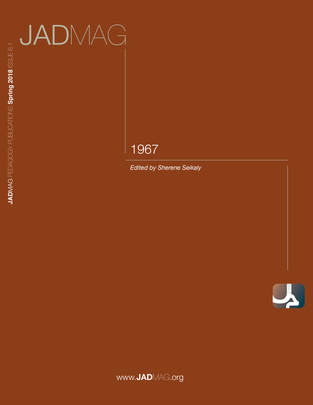
The last two years have been chock full of commemorations, from World War I to the Russian Revolution and many in between. With each of these commemorations, scholars and observers attempt to put history in conversation with the global darkness of our times. Today we commemorate the 1967 Six Day War. On 5 June 1967, Israel tripled its territory, occupying the West Bank, Gaza Strip, East Jerusalem, the Sinai Peninsula, and the Golan Heights. The Israeli army had put a decisive end to the power and ambition of both pan-Arabism and the armies that were meant to fight on its behalf. The defeat was rapid and deep. The consequences would be just as deep and continue to constitute of the present.
A group of Jadaliyya editors and contributors have come together here to think, not about the war itself but about its historical, territorial, temporal, epistemological, and affective legacies and registers.
In the roundtable on “The 1967 Defeat and the Conditions of the Now,” Lisa Hajjar and Noura Erakat provide a thorough grounding of the significance of 1967 in the realm of law. They delineate the realities of the iron cage and the horizon of strategy. Omar Dahi reflects on 1967 as the death of one strand of internationalism and possibility. Muriam Haleh Davis reads Algeria and Palestine together as historical myth, lived reality, and tortured present. Maya Mikdashi reflects on 1967 as a theoretical wormhole to think about Michigan and Palestine and the capacious power of settler colonialism that unites them. Ziad Abu-Rish issues a call to dispense with the 1967 War as an analytical crutch in order to interrogate otherwise overlooked questions of its broad-ranging and ongoing legacies. Anthony Alessandrini sheds piercing light on the silence on Palestine and its various temporalities in the field of postcolonial studies; he connects this silence to current attempts to contain criticism of Israeli settler colonialism. Nadya Sbaiti offers a sensory tour through the ubiquitous erasures of the legacies of 1967 in today’s Lebanon. Adel Iskandar ponders 1967 as the death of an anti-imperialist broadcasting project, Sawt al-‘Arab, and its demise into the individuated Arab media of the present. Hesham Sallam gives tribute to the idea of defeat in Egypt’s brutalized present. He characterizes the present as an ongoing naksa, a setback that has molded into permanent defeat. Bassam Haddad traces the misunderstandings of revolution that resulted in Arab authoritarianism’s resilient power, and Syria’s present calamity. Mouin Rabbani concludes the roundtable with a survey of historical trajectories and contemporary imperatives to end the occupation. Together these pieces offer reflections on law, Third Worldism, history, temporality, knowledge, epistemology, and the conditions of the now.
Omri Ben Yehuda, in “As Thyself: The 1967 War and the Mizrahim,” unpacks the Israel left, ethnicity feuds within the paradigm of Zionism, and the complicated standing of Mizrahim in Israel. As she writes, “In the Israel of 1948 the secular Jew is created through the negation of the Arabs, and in Israel post-1967, through the negation of Mizrahim, which occurs alongside allegedly loving Arabs.”
Osama Esber writes about reproducing the defeat in the region by regimes which only care about staying in power even if this requires sacrificing the state itself and the people.
تتحدث المداخلة عن تكرر الهزيمة وإعادة إنتاجها في سياق يتسم بالاهتمام بالبقاء في السلطة مهما كانت التكلفة وما يؤدي إليه هذا من تضييع للحقوق ولتاريخ طويل من الصراع الذي لم يؤد إلى أية نتيجة مهمة.
In “Critical Readings in Political Economy: 1967,” Max Ajl presents and analyzes Guy Laron’s The Six-Day War (Yale University Press, 2017) for all its strengths and weaknesses in understanding the precipitative roots and subsequent outcomes of the 1967 War. As he argues in his conclusion, the book offers an opportunity to understand the war through the lens of world systems theory, and as part of an ongoing process of decolonization that conflicted with global forces seeking an alternate vision of the region.
In “Familiar Ruptures and Opportunities: 1967 and 2017,” Noura Erakat articulates the ongoing legal, economic, and political framework that gives Israel the ability and right to subjugate the West Bank and Gaza. She argues that the PLO has lost its ability to effectively lead the Palestinian people, as it had in the aftermath of the 1967 War. Given the conditions of today and the ongoing persistence of Israeli settler colonial violence, it needs to introduce a new vision of Palestinian sovereignty in order to facilitate a strategy of resistance against Israeli effort of elimination.
Mouin Rabbani briefly details the ongoing dispossession of the Palestinian people in “The 1967 June War and the Palestinian
National Movement,” and simultaneously traces the role of Palestinians in the post-colonial. He concludes that the Palestinian national movement that arose after 1967 has been disintegrating ever since, but that it must be reinvigorated to bring about the ultimate liberation of the Palestinian people.
In “What is Special about Israel?” Ran Greenstein details the unprecedented establishment of the Israeli state during the nakhba, and how the war of 1967 both affirmed and simultaneously reversed some of the settler colonial state-building projects that Israel was occupied with for both the newly-captured West Bank and Gaza. He finds, ultimately, that the specific ethnic, political, and diplomatic conditions of Israel ultimately allow it to insist it is justified in enforcing an apartheid regime.
With all of the articles presented here, we hope to bring about a more profound understanding of the 1967 Six Day War and its aftereffects for the region, and particularly for the Palestinian conscience. We hope you find these articles as informative, and as affective, as we do.
For more information, go to the bibliography.
A group of Jadaliyya editors and contributors have come together here to think, not about the war itself but about its historical, territorial, temporal, epistemological, and affective legacies and registers.
In the roundtable on “The 1967 Defeat and the Conditions of the Now,” Lisa Hajjar and Noura Erakat provide a thorough grounding of the significance of 1967 in the realm of law. They delineate the realities of the iron cage and the horizon of strategy. Omar Dahi reflects on 1967 as the death of one strand of internationalism and possibility. Muriam Haleh Davis reads Algeria and Palestine together as historical myth, lived reality, and tortured present. Maya Mikdashi reflects on 1967 as a theoretical wormhole to think about Michigan and Palestine and the capacious power of settler colonialism that unites them. Ziad Abu-Rish issues a call to dispense with the 1967 War as an analytical crutch in order to interrogate otherwise overlooked questions of its broad-ranging and ongoing legacies. Anthony Alessandrini sheds piercing light on the silence on Palestine and its various temporalities in the field of postcolonial studies; he connects this silence to current attempts to contain criticism of Israeli settler colonialism. Nadya Sbaiti offers a sensory tour through the ubiquitous erasures of the legacies of 1967 in today’s Lebanon. Adel Iskandar ponders 1967 as the death of an anti-imperialist broadcasting project, Sawt al-‘Arab, and its demise into the individuated Arab media of the present. Hesham Sallam gives tribute to the idea of defeat in Egypt’s brutalized present. He characterizes the present as an ongoing naksa, a setback that has molded into permanent defeat. Bassam Haddad traces the misunderstandings of revolution that resulted in Arab authoritarianism’s resilient power, and Syria’s present calamity. Mouin Rabbani concludes the roundtable with a survey of historical trajectories and contemporary imperatives to end the occupation. Together these pieces offer reflections on law, Third Worldism, history, temporality, knowledge, epistemology, and the conditions of the now.
Omri Ben Yehuda, in “As Thyself: The 1967 War and the Mizrahim,” unpacks the Israel left, ethnicity feuds within the paradigm of Zionism, and the complicated standing of Mizrahim in Israel. As she writes, “In the Israel of 1948 the secular Jew is created through the negation of the Arabs, and in Israel post-1967, through the negation of Mizrahim, which occurs alongside allegedly loving Arabs.”
Osama Esber writes about reproducing the defeat in the region by regimes which only care about staying in power even if this requires sacrificing the state itself and the people.
تتحدث المداخلة عن تكرر الهزيمة وإعادة إنتاجها في سياق يتسم بالاهتمام بالبقاء في السلطة مهما كانت التكلفة وما يؤدي إليه هذا من تضييع للحقوق ولتاريخ طويل من الصراع الذي لم يؤد إلى أية نتيجة مهمة.
In “Critical Readings in Political Economy: 1967,” Max Ajl presents and analyzes Guy Laron’s The Six-Day War (Yale University Press, 2017) for all its strengths and weaknesses in understanding the precipitative roots and subsequent outcomes of the 1967 War. As he argues in his conclusion, the book offers an opportunity to understand the war through the lens of world systems theory, and as part of an ongoing process of decolonization that conflicted with global forces seeking an alternate vision of the region.
In “Familiar Ruptures and Opportunities: 1967 and 2017,” Noura Erakat articulates the ongoing legal, economic, and political framework that gives Israel the ability and right to subjugate the West Bank and Gaza. She argues that the PLO has lost its ability to effectively lead the Palestinian people, as it had in the aftermath of the 1967 War. Given the conditions of today and the ongoing persistence of Israeli settler colonial violence, it needs to introduce a new vision of Palestinian sovereignty in order to facilitate a strategy of resistance against Israeli effort of elimination.
Mouin Rabbani briefly details the ongoing dispossession of the Palestinian people in “The 1967 June War and the Palestinian
National Movement,” and simultaneously traces the role of Palestinians in the post-colonial. He concludes that the Palestinian national movement that arose after 1967 has been disintegrating ever since, but that it must be reinvigorated to bring about the ultimate liberation of the Palestinian people.
In “What is Special about Israel?” Ran Greenstein details the unprecedented establishment of the Israeli state during the nakhba, and how the war of 1967 both affirmed and simultaneously reversed some of the settler colonial state-building projects that Israel was occupied with for both the newly-captured West Bank and Gaza. He finds, ultimately, that the specific ethnic, political, and diplomatic conditions of Israel ultimately allow it to insist it is justified in enforcing an apartheid regime.
With all of the articles presented here, we hope to bring about a more profound understanding of the 1967 Six Day War and its aftereffects for the region, and particularly for the Palestinian conscience. We hope you find these articles as informative, and as affective, as we do.
For more information, go to the bibliography.

